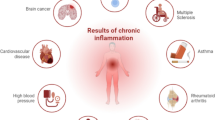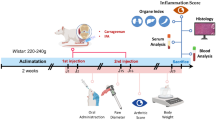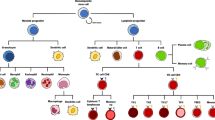Abstract
Ganoderma lucidum (Fr.) Karst (Ganodermataceae) is a medicinal mushroom that has been extensively used in China for centuries to promote longevity and improve vigor without significant adverse effects. There is continuous interest in the bioactive properties of G. lucidum in view of its newly developed popularity in other regions besides Asia, such as Europe. Glycopeptide derived from G. lucidum (Gl-PS) is one of the main effective components isolated from this mushroom. The Gl-PS has been demonstrated pleiotropic with many bioactivities including immunomodulatory and antitumor effects. Macrophages are important cells involved in innate and adaptive immunity. Classically activated macrophages (M1) and alternatively activated macrophages (M2), with their different roles, display distinct cytokine profiles: M1 preferentially produces TNF-α, IL-6, and IL-12; conversely, M2 generates more IL-10 and arginase. Gl-PS might have the potential to promote macrophage M1 polarization by lipopolysaccharide (LPS). In this study, LPS was used to induce the M1 polarization. It was shown that the level of the TNF-α, IL-6, and IL-12 were increased and the IL-10 and arginase I were decreased in the polarized M1 macrophages after application of Gl-PS compared to the control. The results indicated the potential of Gl-PS to promote M1 polarization vs M2, with the health beneficial understanding of the bioactivities of Gl-PS.



Similar content being viewed by others
References
Zhou M, Zhang Y, Chen X, Zhu J, Du M, Zhou L, Zhang L, Wang W, Sun G. PTEN-Foxo1 signaling triggers HMGB1-mediated innate immune responses in acute lung injury. Immunol Res. 2015;62(1):95–105.
Pavlov VA, Tracey KJ. Neural circuitry and immunity. Immunol Res. 2015;63(1–3):38–57.
Yang L, Liao YT, Yang XF, Reng LW, Qi H, Li FR. Immune protective effect of human alpha-1-antitrypsin gene during β cell transplantation in diabetic mice. Immunol Res. 2015;62(1):71–80.
Luan YY, Yao YM, Xiao XZ, Sheng ZY. Insights into the apoptotic death of immune cells in sepsis. J Interf Cytokine Res. 2015;35(1):17–22.
Bhattacharya P, Budnick I, Singh M, Thiruppathi M, Alharshawi K, Elshabrawy H, Holterman MJ, Prabhakar BS. Dual role of GM-CSF as a pro-inflammatory and a regulatory cytokine: implications for immune therapy. J Interf Cytokine Res. 2015;35(8):585–99.
Guha D, Klamar CR, Reinhart T, Ayyavoo V. Transcriptional regulation of CXCL5 in HIV-1-infected macrophages and its functional consequences on CNS pathology. J Interf Cytokine Res. 2015;35(5):373–84.
Schorn T, Drago F, Tettamanti G, Valvassori R, de Eguileor M, Vizioli J, Grimaldi A. Homolog of allograft inflammatory factor-1 induces macrophage migration during innate immune response in leech. Cell Tissue Res. 2015;359(3):853–64.
Tugal D, Liao X, Jain MK. Transcriptional control of macrophage polarization. Arterioscler Thromb Vasc Biol. 2013;33(6):1135–44.
Reichard AC, Cheemarla NR, Bigley NJ. SOCS1/3 expression levels in HSV-1-infected, cytokine-polarized and -unpolarized macrophages. J Interf Cytokine Res. 2015;35(1):32–41.
Jung da H, Kim KH, Byeon HE, Park HJ, Park B, Rhee DK, Um SH, Pyo S. Involvement of ATF3 in the negative regulation of iNOS expression and NO production inactivated macrophages. Immunol Res. 2015;62(1):35–45.
Ampem G, Azegrouz H, Bacsadi Á, Balogh L, Schmidt S, Thuróczy J, Röszer T. Adipose tissue macrophages in non-rodent mammals: a comparative study. Cell Tissue Res. 2016;363(2):461–78.
Da Silva N, Barton CR. Macrophages and dendritic cells in the post-testicular environment. Cell Tissue Res. 2016;363(1):97–104.
He M, Dong H, Huang Y, Lu S, Zhang S, Qian Y, Jin W. Astrocyte-derived CCL2 is associated with M1 activation and recruitment of cultured microglial cells. Cell Physiol Biochem. 2016;38(3):859–70.
Li F, Zhu X, Yang Y, Huang L, Xu J. TIPE2 alleviates systemic lupus erythematosus through regulating macrophage polarization. Cell Physiol Biochem. 2016;38(1):330–9.
Zhu L, Zhao Q, Yang T, Ding W, Zhao Y. Cellular metabolism and macrophage functional polarization. Int Rev Immunol. 2015;34(1):82–100.
Chanmee T, Ontong P, Konno K, Itano N. Tumor-associated macrophages as major players in the tumor microenvironment. Cancers (Basel). 2014;6(3):1670–90.
Kabir Y, Kimura S, Tamura T. Dietary effect of Ganoderma lucidum mushroom on blood pressure and lipid levels in spontaneously hypertensive rats (SHR). J Nutr Sci Vitaminol (Tokyo). 1988;34(4):433–8.
Ren LK, Vasil’ev AV, Orekhov AN, Tertov VV, Tutel’ian VA. Anti-atherosclerotic properties of higher mushrooms (a clinico-experimental investigation). Vopr Pitan. 1989; (1):16–19.
Berger A, Rein D, Kratky E, Monnard I, Hajjaj H, Meirim I, Piguet-Welsch C, Hauser J, Mace K, Niederberger P. Cholesterol-lowering properties of Ganoderma lucidum in vitro, ex vivo, and in hamsters and minipigs. Lipids Health Dis. 2004;3:2.
Wicks SM, Tong R, Wang CZ, O’Connor M, Karrison T, Li S, Moss J, Yuan CS. Safety and tolerability of Ganoderma lucidum in healthy subjects: a double-blind randomized placebo-controlled trial. Am J Chin Med. 2007;35(3):407–14.
Zhang J, Gao X, Pan Y, Xu N, Jia L. Toxicology and immunology of Ganoderma lucidum polysaccharides in Kunming mice andWistar rats. Int J Biol Macromol. 2016;85:302–10.
Shang D, Zhang J, Wen L, Li Y, Cui Q. Preparation, characterization, and antiproliferative activities of the Se-containing polysaccharide SeGLP-2B-1 from Se-enriched Ganoderma lucidum. J Agric Food Chem. 2009;57(17):7737–42.
Shang D, Li Y, Wang C, Wang X, Yu Z, Fu X. A novel polysaccharide from Se-enriched Ganoderma lucidum induces apoptosis of human breast cancer cells. Oncol Rep. 2011;25(1):267–72.
Delzenne NM, Bindels LB. Gut microbiota: Ganoderma lucidum, a new prebiotic agent to treat obesity? Nat Rev Gastroenterol Hepatol. 2015;12(10):553–4.
Chang CJ, Lin CS, Lu CC, Martel J, Ko YF, Ojcius DM, Tseng SF, Wu TR, Chen YY, Young JD, Lai HC. Ganoderma lucidum reduces obesity in mice by modulating the composition of the gut microbiota. Nat Commun. 2015;6:7489.
Zheng J, Yang B, Yu Y, Chen Q, Huang T, Li D. Ganoderma lucidum polysaccharides exert anti-hyperglycemic effect on streptozotocin-induced diabetic rats through affecting β-cells. Comb Chem High Throughput Screen. 2012;15(7):542–50.
Rzymski P, Mleczek M, Niedzielski P, Siwulski M, Gąsecka M. Potential of cultivated Ganoderma lucidum mushrooms for the production of supplements enriched with essential elements. J Food Sci. 2016;81(3):C587–92.
Zhong D, Wang H, Liu M, Li X, Huang M, Zhou H, Lin S, Lin Z, Yang B. Ganoderma lucidum polysaccharide peptide prevents renal ischemia reperfusion injury via counteracting oxidative stress. Sci Rep. 2015;5:16910.
Cao QZ, Lin ZB. Ganoderma lucidum polysaccharides peptide inhibits the growth of vascular endothelial cell and the induction of VEGF in human lung cancer cell. Life Sci. 2006;78(13):1457–63.
You YH, Lin ZB. Protective effects of Ganoderma lucidum polysaccharides peptide on injury of macrophages induced by reactive oxygen species. Acta Pharmacol Sin. 2002;23(9):787–91.
Tie L, Yang HQ, An Y, Liu SQ, Han J, Xu Y, Hu M, Li WD, Chen AF, Lin ZB, Li XJ. Ganoderma lucidum polysaccharide accelerates refractory wound healing by inhibition of mitochondrial oxidative stress in type 1 diabetes. Cell Physiol Biochem. 2012;29(3–4):583–94.
Li WD, Zhang BD, Wei R, Liu JH, Lin ZB. Reversal effect of Ganoderma lucidum polysaccharide on multidrug resistance in K562/ADM cell line. Acta Pharmacol Sin. 2008;29(5):620–7.
Zhu XL, Chen AF, Lin ZB. Ganoderma lucidum polysaccharides enhance the function of immunological effector cells in immunosuppressed mice. J Ethnopharmacol. 2007;111(2):219–26.
Sun LX, Li WD, Lin ZB, Duan XS, Xing EH, Jiang MM, Yang N, Qi HH, Sun Y, Li M, Niu YD, Lu J. Cytokine production suppression by culture supernatant of B16F10 cells and amelioration by Ganoderma lucidum polysaccharides in activated lymphocytes. Cell Tissue Res. 2015;360(2):379–89.
Cheng S, Sliva D. Ganoderma lucidum for cancer treatment: we are close but still not there. Integr Cancer Ther. 2015;14(3):249–57.
Sun LX, Li WD, Lin ZB, Duan XS, Li XF, Yang N, Lan TF, Li M, Sun Y, Yu M, Lu J. Protection against lung cancer patient plasma-induced lymphocyte suppression by Ganoderma lucidum polysaccharides. Cell Physiol Biochem. 2014;33(2):289–99.
Sun LX, Lin ZB, Duan XS, Qi HH, Yang N, Li M, Xing EH, Sun Y, Yu M, Li WD, Lu J. Suppression of the production of transforming growth factor β1, interleukin-10, and vascular endothelial growth factor in the B16F10 cells by Ganoderma lucidum polysaccharides. J Interf Cytokine Res. 2014;34(9):667–75.
Sun LX, Lin ZB, Duan XS, Lu J, Ge ZH, Li M, Xing EH, Lan TF, Jiang MM, Yang N, Li WD. Ganoderma lucidum polysaccharides counteract inhibition on CD71 and FasL expression by culture supernatant of B16F10 cells upon lymphocyte activation. Exp Ther Med. 2013;5(4):1117–22.
Sun LX, Lin ZB, Duan XS, Lu J, Ge ZH, Li XF, Li XJ, Li M, Xing EH, Song YX, Jia J, Li WD. Enhanced MHC class I and costimulatory molecules on B16F10 cells by Ganoderma lucidum polysaccharides. J Drug Target. 2012;20(7):582–92.
Sun LX, Lin ZB, Li XJ, Li M, Lu J, Duan XS, Ge ZH, Song YX, Xing EH, Li WD. Promoting effects of Ganoderma lucidum polysaccharides on B16F10 cells to activate lymphocytes. Basic Clin Pharmacol Toxicol. 2011;108(3):149–54.
Lu J, Sun LX, Lin ZB, Duan XS, Ge ZH, Xing EH, Lan TF, Yang N, Li XJ, Li M, Li WD. Antagonism by Ganoderma lucidum polysaccharides against the suppression by culture supernatants of B16F10 melanoma cells on macrophage. Phytother Res. 2014;28(2):200–6.
Sun LX, Lin ZB, Duan XS, Lu J, Ge ZH, Li XJ, Li M, Xing EH, Jia J, Lan TF, Li WD. Ganoderma lucidum polysaccharides antagonize the suppression on lymphocytes induced by culture supernatants of B16F10 melanoma cells. J Pharm Pharmacol. 2011;63(5):725–35.
Fleetwood AJ, Lawrence T, Hamilton JA, Cook AD. Granulocyte-macrophage colony-stimulating factor (CSF) and macrophage CSF-dependent macrophage phenotypes display differences in cytokine profiles and transcription factor activities: implications for CSF blockade in inflammation. J Immunol. 2007;178(8):5245–52.
Dzik JM. Evolutionary roots of arginase expression and regulation. Front Immunol. 2014;5:544.
Yu Z, Zhang Y, Gao N, Yong K. Suppression of development of ankylosing spondylitis through soluble Flt-1. Cell Physiol Biochem. 2015;37(6):2135–42.
Sun L, He C, Nair L, Yeung J, Egwuagu CE. Interleukin 12 (IL-12) family cytokines: role in immune pathogenesis and treatment of CNS autoimmune disease. Cytokine. 2015;75(2):249–55.
Watford WT, Moriguchi M, Morinobu A, O’Shea JJ. The biology of IL-12: coordinating innate and adaptive immune responses. Cytokine Growth Factor Rev. 2003;14(5):361–8.
Moore KW, de Waal MR, Coffman RL, O’Garra A. Interleukin-10 and the interleukin-10 receptor. Annu Rev Immunol. 2001;19:683–765.
Mauer J, Denson JL, Brüning JC. Versatile functions for IL-6 in metabolism and cancer. Trends Immunol. 2015;36(2):92–101.
Hunter CA, Jones SA. IL-6 as a keystone cytokine in health and disease. Nat Immunol. 2015;16(5):448–57.
He L, Marneros AG. Doxycycline inhibits polarization of macrophages to the proangiogenic M2-type and subsequent neovascularization. J Biol Chem. 2014;289(12):8019–28.
Chang ST, Wasser SP. The role of culinary-medicinal mushrooms on human welfare with a pyramid model for human health. Int J Med Mushrooms. 2012;14(2):95–134.
Sanodiya BS, Thakur GS, Baghel RK, Prasad GB, Bisen PS. Ganoderma lucidum: a potent pharmacological macrofungus. Curr Pharm Biotechnol. 2009;10(8):717–42.
Hsieh TC, Wu JM. Suppression of proliferation and oxidative stress by extracts of Ganoderma lucidum in the ovarian cancer cell line OVCAR-3. Int J Mol Med. 2011;28(6):1065–9.
Chen WY, Yang WB, Wong CH, Shih DT. Effect of Reishi polysaccharides on human stem/progenitor cells. Bioorg Med Chem. 2010;18(24):8583–91.
Xu Z, Chen X, Zhong Z, Chen L, Wang Y. Ganoderma lucidum polysaccharides: immunomodulation and potential anti-tumor activities. Am J Chin Med. 2011;39(1):15–27.
Jan RH, Lin TY, Hsu YC, Lee SS, Lo SY, Chang M, Chen LK, Lin YL. Immuno-modulatory activity of Ganoderma lucidum-derived polysaccharide on human monocytoid dendritic cells pulsed with Der p 1 allergen. BMC Immunol. 2011;12:31.
Thyagarajan-Sahu A, Lane B, Sliva D. ReishiMax, mushroom based dietary supplement, inhibits adipocyte differentiation, stimulates glucose uptake and activates AMPK. BMC Complement Altern Med. 2011;11:74.
Chang SS, Zhou D, Meng GL, Wu F, Wang S, Chen X, Xu JL. Effect of Ganoderma lucidum polysaccharides on oxidative stress of hyperlipidemic fatty liver in rats (Article in Chinese). Zhongguo Zhong Yao Za Zhi. 2012;37(20):3102–6.
Wang SH, Liang CJ, Weng YW, Chen YH, Hsu HY, Chien HF, Tsai JS, Tseng YC, Li CY, Chen YL. Ganoderma lucidum polysaccharides prevent platelet-derived growth factor-stimulated smooth muscle cell proliferation in vitro and neointimal hyperplasia in the endothelial-denuded artery in vivo. J Cell Physiol. 2012;227(8):3063–71.
Pan XQ. The mechanism of the anticancer function of M1 macrophages and their use in the clinic. Chin J Cancer. 2012;31(12):557–63.
Gao L, Zhou Y, Zhou SX, Yu XJ, Xu JM, Zuo L, Luo YH, Li XA. PLD4 promotes M1 macrophages to perform antitumor effects in colon cancer cells. Oncol Rep. 2017;37(1):408–16.
Loures FV, Araújo EF, Feriotti C, Bazan SB, Costa TA, Brown GD, Calich VL. Dectin-1 induces M1 macrophages and prominent expansion of CD8+ IL-17+ cells in pulmonary Paracoccidioidomycosis. J Infect Dis. 2014;210(5):762–73.
Gómez-Rodríguez J, Stijlemans B, De Muylder G, Korf H, Brys L, Berberof M, Darji A, Pays E, De Baetselier P, Beschin A. Identification of a parasitic immunomodulatory protein triggering the development of suppressive M1 macrophages during African trypanosomiasis. J Infect Dis. 2009;200(12):1849–60.
Acknowledgments
This study was supported by the Special Fundation for Clinical Medical Research in China (grant number L2012069), Key Programs for Medical Scientific Research in Hebei province, China (grant number 20130339), Population and Family Planning Commission Programs for Scientific Research, Hebei province, China (grant number 2013-B13), and Medical Application Technology Tracking Programs, Hebei province, China (grant number GL201309).
The authors thank Professor Shuqian Lin of the Fuzhou Institute of Green Valley Bio-Pharm Technology for providing the Gl-PS.
Author information
Authors and Affiliations
Corresponding authors
Ethics declarations
The use of mice was approved by the Ethics Committee of The Affiliated Hospital of Chengde Medical College (ID number: 2013–040).
Conflict of interest
The authors declare that they have no conflicts of interest.
Rights and permissions
About this article
Cite this article
Sun, LX., Lin, ZB., Lu, J. et al. The improvement of M1 polarization in macrophages by glycopeptide derived from Ganoderma lucidum . Immunol Res 65, 658–665 (2017). https://doi.org/10.1007/s12026-017-8893-3
Published:
Issue Date:
DOI: https://doi.org/10.1007/s12026-017-8893-3




